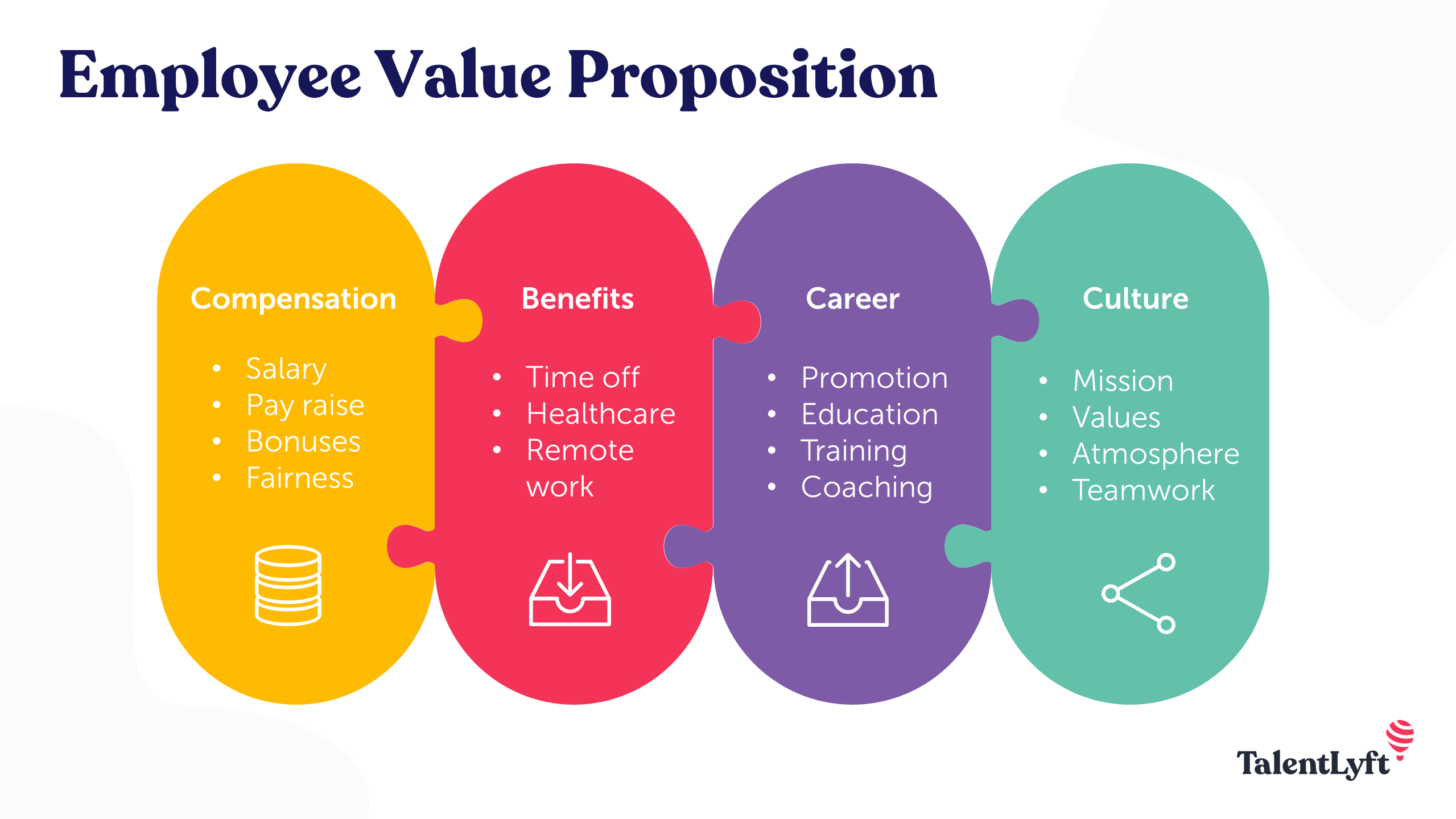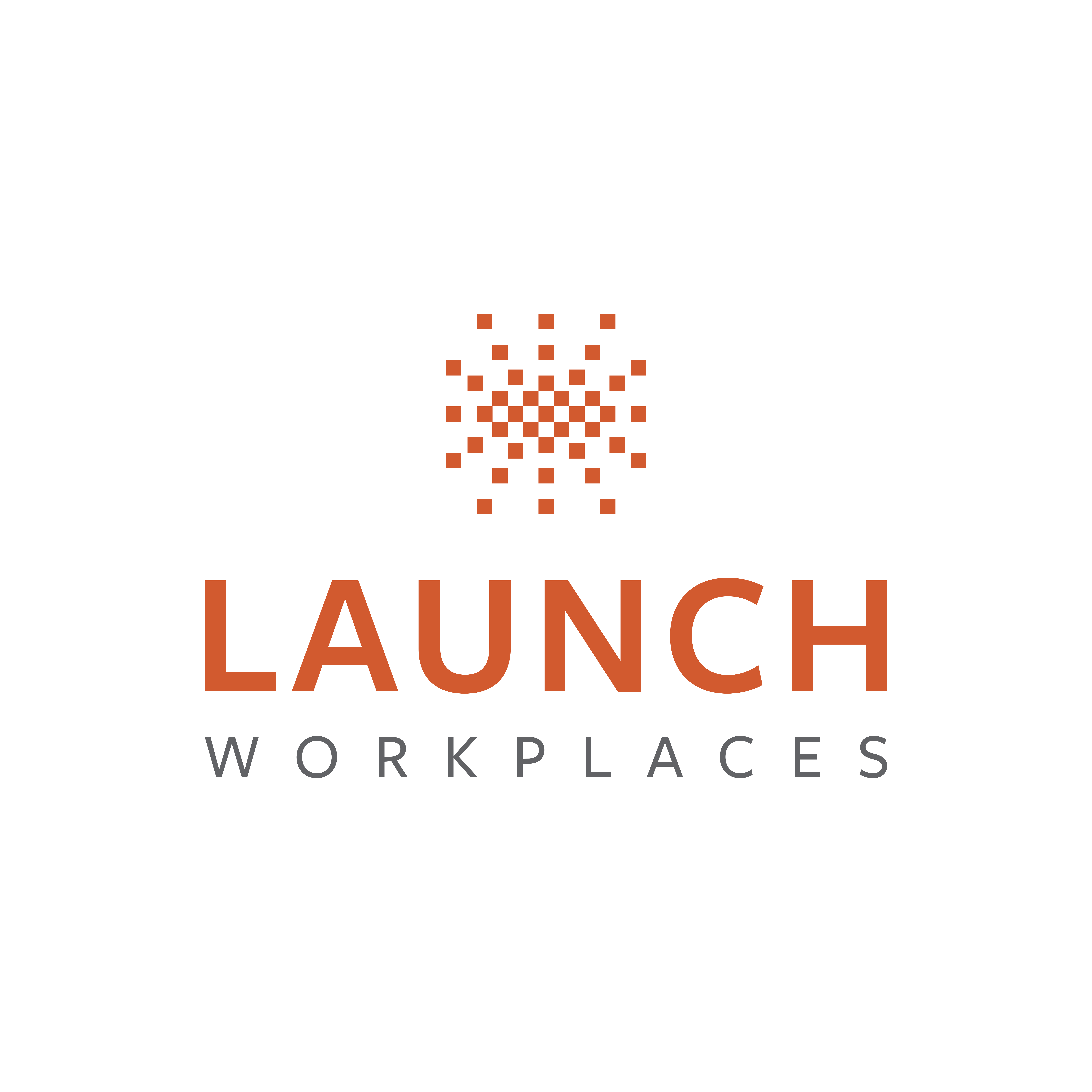Attracting and retaining top talent is hard.
Doing so in the wake of a global pandemic, a worldwide shift to remote work, and changing generational preferences makes it significantly more so.
And that’s why your Employee Value Proposition (EVP) matters more now than it ever has. It’s one of the key tactics your company can use to stay ahead of your competition and ensure your business remains appealing to job seekers who can readily go elsewhere.
Here’s what you need to know.
What is Employee Value Proposition?
The term Employee Value Proposition refers to the experience offered to an employee in exchange for their skills, experience, and qualifications.
Your EVP is the internal equivalent of your USP (unique selling proposition) for your customers—it’s what’s unique and different about your company, or the reason to work for you instead of a competitor.
In an employment market where the employees hold most of the power, your company’s EVP answers every employee’s biggest question when they’re applying for a job: why should I work for you rather than someone else?
In the past, EVP used to be mostly about salaries and benefits. And while that will always be important, today it goes far beyond that. Some factors that contribute to EVP include:
- Career development opportunities: Training, conferences, mentorship, tuition reimbursement
- Company values: Corporate social responsibility and giving back to meaningful causes, collaboration, communication, and teamwork
- Workplace culture: Opportunities for socialization, strong interpersonal relationships, or fun events and initiatives
- Perks and extras: Coffee and food, gym memberships, and daycare services
- Work arrangements: Work from home, remote work, and flexible scheduling
- Total financial compensation and benefits: Stock options, bonuses, paid time off, leave allowances, and health and dental benefits (check out our article on the most desired employee benefits post-pandemic)
- Work-life balance: Flex time, wellness initiatives, and reduced commute times
As each company and employee differs, this is a non-exhaustive list. It represents some common areas to consider regarding EVP and many of them are in line with research about what the best places of work have in common.

Why EVP Matters in 2022
EVP matters in 2022 because employees have options.
Remote work has created more opportunities for employees, and they’re looking for the best option. Companies and leaders need to put increased focus on aligning EVP with their ideal candidates in order to attract and retain professionals who could easily go elsewhere.
There are a few reasons EVP is more important now than ever before:
- New ways of working: Pandemic-induced remote work as the norm has opened up the world to many employees—there’s no need to only look for roles in your geographical area.
- Shifting values: Health and environmental crises, economic challenges, and social justice issues have shifted cultural values. Today, DEI (diversity, equity, and inclusion), safe and inclusive workspaces, work-life balance, flexibility, and corporate social responsibility are highly valued in the workplace.
- Labor shortages: Many industries are struggling with hiring and retention, either due to people seeking new opportunities or general labor shortage issues.
In light of these changes to the working world, EVP needs to be top-of-mind for business owners and leaders in 2022 and beyond. It will help attract and retain top talent to your organization.
How to Increase Your EVP
1. Take stock of your current EVP
Start by taking stock of what you currently offer employees. Scroll back up to the list of possible EVP areas (i.e., financial, benefits, culture) and consider what you’re doing in each area.
Pro tip: Be hands-on with this process. We’re talking pen and paper, a whiteboard, or something that allows you to clearly map everything out.
2. Conduct market research
Once you understand your current offerings, see how you stack up to the competition with market research. When doing so, make sure you understand who your ideal candidates are. What are they looking for? What are their values, both personally and professionally?
This will help you be clear on what type of employee will be attracted to your company and what companies are competing for those same prospective team members.
Here are a few ideas for market research:
- Review competitor websites to look at how they present their EVP (i.e. values statements or employee testimonials)
- Use websites like Glassdoor to see what employees think about different companies
- Survey your own employees to see what they think about your EVP or current offerings
- Look at what prior employees said in their exit interviews to better understand why they left
- Talk to career counselors, recruiters, or post-secondary university staff to learn more about the goals and aspirations of potential candidates

3. Consider what changes you want to make
After doing the groundwork, start thinking about needed changes. Because each company is unique, it’s impossible to offer specific advice here. That said, there are some standards that all companies should strive to meet.
Here are a few areas to guide you:
- Are you hitting the basics? When it comes to financial compensation and benefits, you need to have generous, transparent, market-rate offers. While it’s not the most important part of EVP, you need to get it right before building on anything else.
- What are you doing to support work-life balance? General employee health and wellbeing are contingent on strong work-life or remote work-life balance. Among other things, this means having flexible policies that support employees’ personal lives, strong boundaries around time off, and manageable workloads.
- Is your workplace somewhere people want to be? The workspace itself can be an EVP booster. When employees have the option to work from anywhere, getting them into the office means having a space that enhances their daily lives. You need to offer them a place where they want to be, one that’s buzzing and full of life. Features of great workplaces include a focus on hospitality, opportunities for networking, events and socialization, and on-the-job learning. Vibrant, supportive, inclusive workplaces draw people in. Even for employees with hybrid or remote work schedules, having an office they actually want to go to on occasion can be a game changer. Alternate working arrangements like shared coworking spaces can also build EVP by offering a positive and productive workspace.
4. Does your company allow employees to align work with purpose?
People want their work to matter and make a difference. Your company can support this by clearly stating and upholding company values, investing in social causes, and prioritizing corporate social responsibility (CSR). Providing professional development and advancement opportunities also helps employees feel purposeful and supported in their roles.
Whether you’re happy with your company’s EVP or planning on making big changes, communication is key.
Develop a plan for communication with these stakeholders:
Current employees: Make sure they understand any possible changes that are being made and the rationale where appropriate. This ensures everyone is aware of the full scope of what’s offered so they can take advantage of it.
Prospective employees: How will people know about your EVP? You’ve got to communicate it clearly. Prospective employees are likely already talking about you via Glassdoor, word-of-mouth conversation, or social media, so you need to be part of the communication and show what you have to offer. Here are some ways to do it:
- Include information on your website about specific offerings and what makes your company unique
- Share staff testimonials on your website or social media
- Articulate EVP in interviews about your company
- Use blogs, videos, podcasts, or other content to highlight your EVP
- Be active on social media or any online space where you can respond to positive and negative reviews or comments about your company
- Add factors related to EVP to job descriptions and postings
Aligning work with purpose and values is particularly important to the younger generations that are quickly making up most of the working population. They value what past generations didn’t as much—working for socially conscious companies that make a positive impact on society by giving back, CSR, and supporting social causes.
5. Keep EVP on the company’s radar
EVP isn’t a “one and done” endeavor. It’s something that needs to be an ongoing process to improve and be better. This means reviewing changes, analyzing employee attraction and retention, keeping up with current trends, and being willing to listen to feedback and adjust accordingly.
- Pro tip: Attach EVP to annual salary reviews to keep it as part of the regular rhythm of your company.
Employee Value Proposition is more than just a market-rate salary and occasional pizza party in the break room. It’s about setting your organization apart and attracting top talent.
EVP in 2022 recognizes that values have changed. Employees today care about work that integrates with their personal purpose, value, and meaning. Giving back and being a socially conscious company should be ingrained into your business, not an afterthought.
Today, job seekers have options. They’re asking: is this the best place for me to work? Does it align with my values? Why should I choose this workplace instead of others? EVP is your answer to those questions and the thing that will help you build and keep the right team for your company.
If you’re looking for a workspace that enhances your company’s EVP and makes the workday more enjoyable for yourself and your team, book a tour of your local Launch Workplace today.



